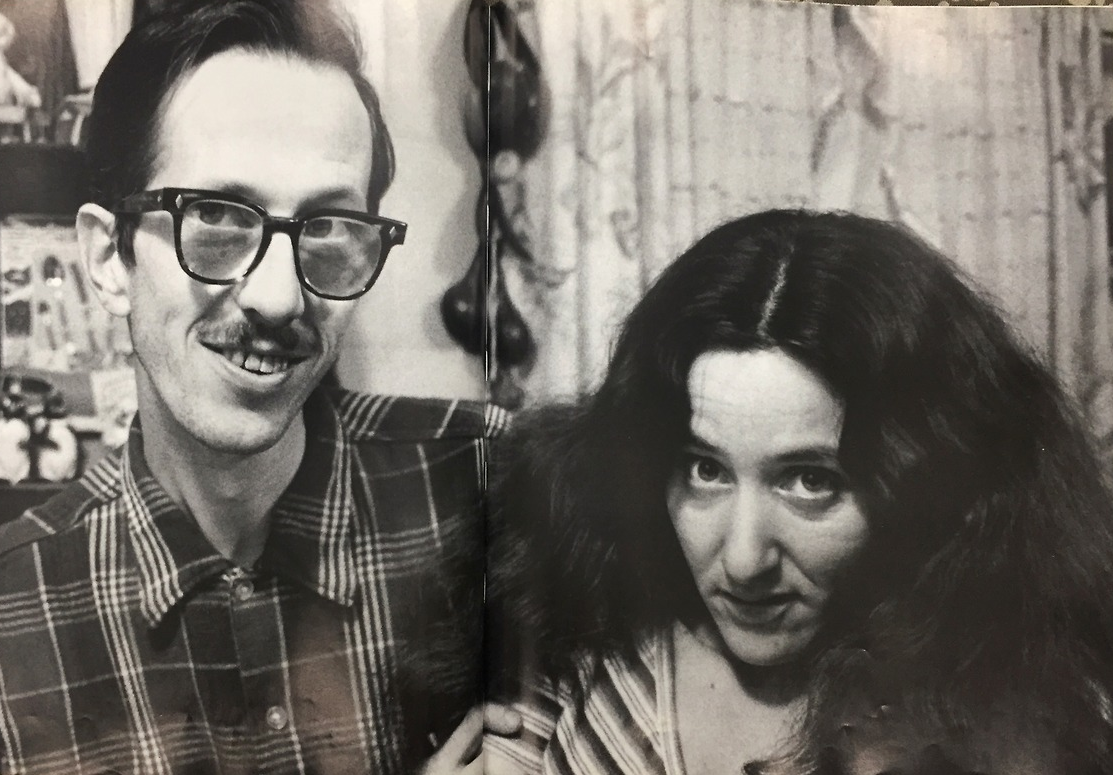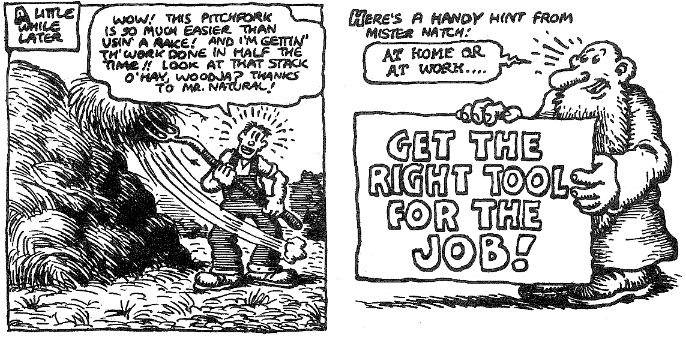RH: Last Sunday I went through my collection of old Whole Earth Catalogs trying to find your first appearance.
RC: In CoEvolution Quarterly?
RH: No, before that. I went back to the Catalogs to see if you might have had something there. I know you did the cover of the Last Supplement in 1971, but lo and behold, in the fall 1970 issue of the Catalog, on pages 122-123, there's a two page spread called "Crazy Comics." It's a review of things from the Print Mint, Ripoff Press and the San Francisco Comic Book Company.
RC: I don't think I ever saw that.
RH: Well, it includes a strip of yours - along with "Keep on Truckin'," the cover of "Gung-ho Comics" and work by others that I don't recognize. Your strip is about Flakey Foont, called "It's a Workaday World." He's trying to rake up some hay and Mr. Natural says...
RC: "Get the right tool for the job!"
RH: Right! Was that a subtle plug for the Whole Earth Catalog there?
RC: No, when I did that strip I was barely aware of the Catalog, which I don't think I even saw until much later.
RH: So how did you get involved with Whole Earth?
RC: Someone from there - it might have been Stewart Brand himself - contacted me and asked me if I would contribute something.
RH: Do you remember when that was?
RC: No.
RH: There's a timeline in the Comics Journal's collection of interviews with you that says you began contributing in June 1977 and that seems right. The earliest contributions to CoEv that I could find are in the summer 1977 issue, where you did the cover and a four-pager called "R. Crumb's Modern Dance Workshop." I must say it's been an honor to have you as a regular contributor because I know you're very selective about where you publish and who you work with. Do you have any rules about that? Is it just whether you like the people, or their values, or that you feel you can trust them?
RC: I think it has to do with values more than anything else. I wasn't interested in doing commercial work, even if it was high paid, especially in those days. I just hated that whole world of advertising and all that. I had learned how to live very modestly and didn't care about making money. I got a bunch of money from the "Fritz the Cat" movie. Those guys were very aggressive. At first I tried to tell them no, in like 1970-71. I said I don't want to do this, I don't think you guys understand my work well enough to do a good job with it. But they were just so aggressive that I couldn't stop them. They just rolled over me and somehow they eventually got my first wife to sign a contract giving them permission to make the film when they were already half-way done with it. Stuff like that happening when I was young really turned me off to business people. They just wanted to exploit me or use me. My basic instincts were to stay away from that world and go along with things that I felt were more enlightened. Whole Earth and CoEvolution Quarterly seemed like more advanced journals for the time. But ironically there were people in that scene that didn't like my work. I got alot of criticism from people on the staff. This one cover that I did that shows a guy with swastikas in his eyeballs...
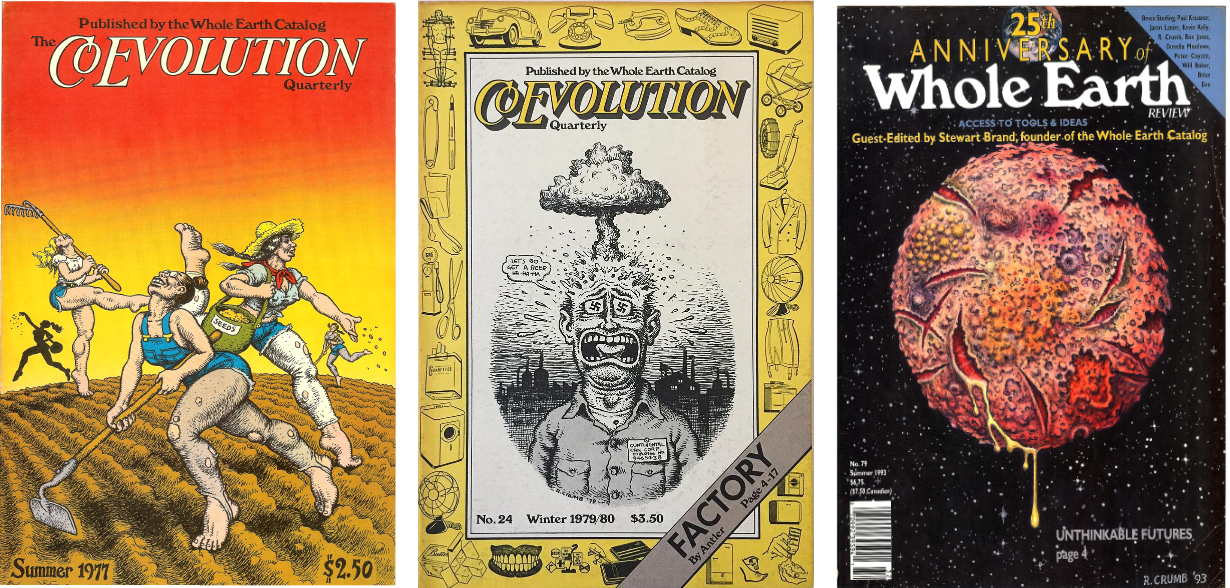
RH: Yeah, the "Factory" issue. I asked Kathleen O'Neill about that. I don't know if you read the interview we recorded last winter.
RC: No.
RH: She said there was alot of blowback from readers about that cover and it really upset Anne Herbert.
RC: Anne Herbert, right. They didn't even want to print it. The staff had a petition against printing it that was vetoed by Stewart Brand. He said no, we're going to print it.
RH: Kathleen also mentioned your dancing hippy girls cover, the one with the bright orange background.
RC: The one with the girls in the field with the hoes?
RH: Right.
RC: Alot of them didn't like my work. They didn't get it. They thought it was sexist or too negative. Those people I would call "humor impaired." Forty years later it's still a problem. Alot of serious left wing people, and politically correct people, just despise my work. They don't see the satire. They don't see that I'm making fun of myself or how absurd everything is. They just take it at face value. Is Stewart Brand still alive?
RH: He is. If you're asking I guess you're not in touch with him.
RC: I haven't talked to him for decades. I was never that close to him. I went to the office sometimes but I was never that tuned in to his sensibilities.
RH: He obviously respected your work.
RC: The only reason I was in CoEvolution Quarterly is because he liked my work. I really felt like an orphan in that magazine. How about Anne Herbert? Is she still alive?
RH: No, she died about 4 years ago. Read those interviews with Kathleen O'Neil and David Wills in the Internet Archive. They'll tell you what happened to her.
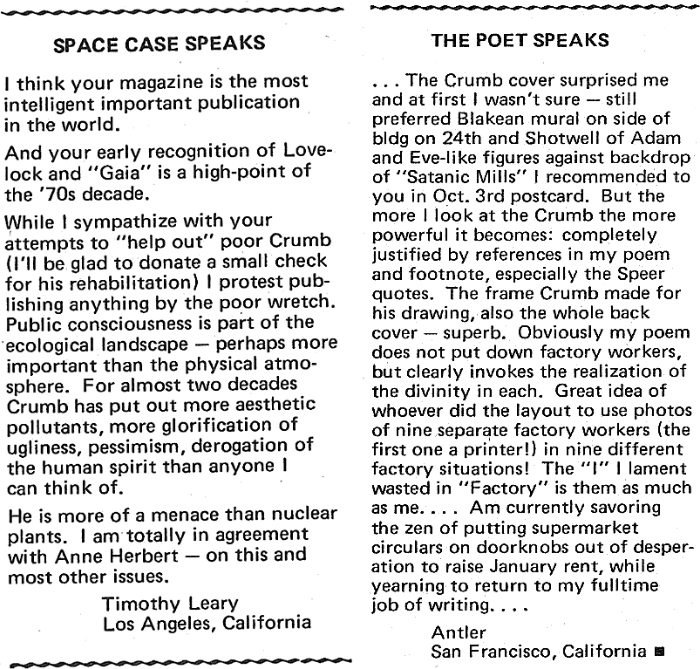
RC: She didn't like my work.
RH: You saw that Tim Leary wrote to Stewart supporting Anne in her fight against you?
RC: Yeah. Leary said I was one of the most negative people in America. I did a strip making fun of him and he didn't like that. He had a plan to get 500 of Earth's richest and most beautiful people together and go to another planet and I made fun of that.
RH: I'm going to put a scan of his letter in this interview.
RC: Here's a letter I saved. It was sent to CoEvolution Quarterly in December 1982. This letter was criticizing a strip that I did about trash, what we throw away. Do you want to hear what this woman says?
RH: Sure.
RC: The title of the letter is "Function of R. Crumb in CQ":
"It has occurred to me to wonder whether you have a sick need for punishment. Looking, for example, at the latest Crumb cartoon (fall 82), I'm not saying it's not true - that picture of the big money boys lining up to gang-rape poor Gaia is not hyperbole. But that's not the point. Nor is what's wrong with Crumb's piece that it's vulgar or shocking. That's irrelevant. Anyway, I bet most of your readers have cut their teeth on National Lampoon and are therefore immune to practically anything. No, it's that it's pure unalloyed negativism.
"Think about your constituency. People who read CQ are types who hop out of bed an hour early in the morning so that we can shoulder our Smith and Hawken pitchforks and rush out to our organic gardens to get in some double digging before breakfast. Or we slip into our bandanas and Birkenstocks and trudge 3 miles to the nearest co-op to bring back our bulk soybeans in a canvas shopping bag. Do people need to have their noses rubbed in what's wrong with our high consumption society? Hell no! We know that stuff already! We're already walking around with permanent worry headaches just from reading the news.
"And that nasty shot about recycling programs. Below the belt! I picture all of us eco-freaks patiently pulling the world wagon, moving pretty well considering the steepness of the uphill slope, and there's Crumb, sitting up on the wagon, cracking the whip and hollering "Faster! Faster!" Now if Crumb really wants action, why doesn't he get his ass going and help pull? Namely, why not take that eye-popping, gut-wrenching technique and use it in a constructive, positive manner? Of course, cartoons showing squadrons of ladies coaxing Safeway officials into providing bulk bring-your-own-container staples, or kids putting up "Don't Waste" posters in school hallways, wouldn't be nearly as exciting as rape scenes. But then we're into quality, not plastic hype, right? Right, Stewart? Right, Crumb? Right?
"With love and respect, Susie Pierce - devoted from-here-on-out reader"

RH: Did you write back to her?
RC: I did actually. I sent her a cartoon that I drew, and never heard from her again. I sent her a cartoon of a big strong girl in bib overalls and a bandana and Birkenstocks, pulling the world wagon - which is like a big ball of earth on wheels - up a steep hill and I'm sitting on top of this world wagon ball of earth, stabbing her in the butt with a pitchfork labeled Smith and Hawken, saying "Faster! Faster! Ha ha ha!"
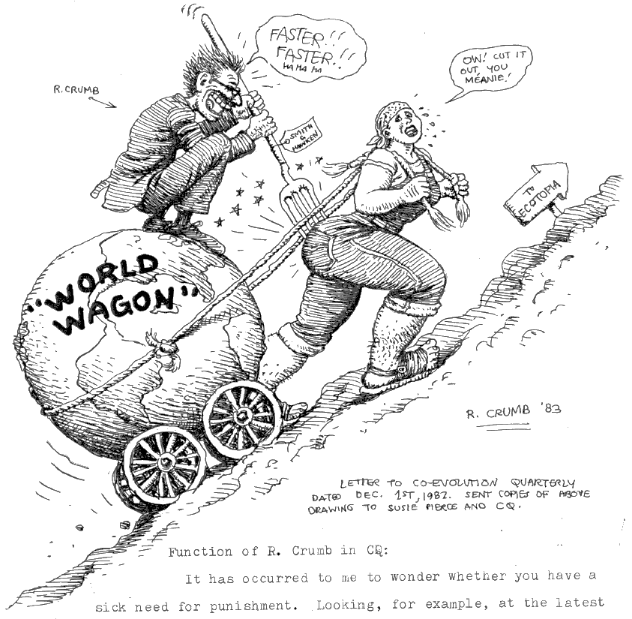
RH: You made it just for her?
RC: Yes.
RH: You didn't happen to save a copy, did you?
RC: Actually, I drew it in my sketchbook first and then sent her a photocopy.
RH: So you have the original?
RC: Yes.
RH: Could you send me a copy?
RC: I'll send you one by email.
RH: Oh, do it! That's fabulous.
RC: Most of the people at CoEvolution Quarterly didn't get my stuff either. They were like Susie Pierce.
RH: That may be your perspective, but from my perspective, your work was essential to the character of Whole Earth's publications.
RC: That's nice of you to say, but it's definitely not how I felt at the time. I was actually a kind of odd sideline of that whole thing, an oddball. There were other oddballs in there, too, but generally people were very serious and earnest. Which I agreed with. I pretty much agreed with what they were up to. One thing I didn't agree with was when they started getting all ga-ga about computers.
RH: You haven't gotten into drawing with a computer?
RC: No.
RH: I still draw by hand, too. We must be part of the analog rebellion.
RC: So it's come to this: analog is now a rebellion. Incredible.
RH: You know, we're going to have this reunion in October in San Francisco. There'll be some sort of art show that goes with it. We really want to include your work, especially if you aren't going to be there in person. If we could borrow some original artwork that Whole Earth published that would be great.
RC: I have no idea where it is. The artwork scattered to the four winds. I sold it all, gave it all away decades ago or traded it for records. None of it got thrown out, all of it is somewhere, but god knows where. I did a cover for Whole Earth showing the earth all beat up...
RH: Oh yeah. I already planned to use that as an illustration in this interview. The earth looks like a pizza with some sort of disease.
RC: That was my satire of the beautiful earth image that was always on the cover of the Whole Earth Catalog.
RH: Do you have the original of that?
RC: It got lost. They were going to send it back to me but they put some huge value on it and it got hung up in customs. I told them to send it back to the Whole Earth office. The people there said they never saw it again. No one knows what happened to it.
RH: It might be on some art collector's wall.
RC: It might be in a warehouse somewhere in the original package.
RH: I learned from the Comics Journal interviews that moving to Europe was Aline's idea. Apparently you went to talk to Gilbert Shelton, who had been living in Paris for a few years and you asked him what it was like. He said it was good and that seemed to tip you over into accepting the idea. Is that about right?
RC: We started going to France every few years in the 80s. I was invited over to the Angoulême Comics Center. They had a show of my work in 1986. And Aline started really liking France and was tired of hearing me bitch and complain about America all the time. She started to talk it up, moving to France, pitching it and pitching it. You know she comes from a long line of Jewish salesmen in her family, so she's really good at selling. And I woke up one morning and I was living in France! How'd that happen? Aline took care of everything. She took care of all the official business and getting all the required papers together.
RH: And it's worked out for you.
RC: Oh yeah, I can't complain at all. It's really nice living here.
RH: How did you find that particular village?
RC: Aline came sometime in the late 80s to see a friend of hers who was living in a village near here and they vaguely knew another couple living here so she came to visit them and she came back and said, oh you gotta go see this village, you gotta check out these empty houses, they're beautiful and cheap. So then we came here together and we looked at empty houses and we found a house that was very reasonable, beautiful and big, and that's where we're living now.
RH: Great. Great. I'm really happy that you've succeeded this much without compromising.
RC: Yeah, somehow I managed to hang on to a shred of integrity.
RH: You often talk about being a social reject as a teenager and wanting to be recognized as a great artist almost in revenge. Doesn't that take your motivation away now that you have achieved success and recognition?
RC: Yeah, that's why I say they're loving me to death. It definitely has de-motivated me, very slowly over the years. There's less and less of that drive to prove myself. In Paris about 5 or 6 years ago they had a big show of my work at the modern art museum [Musée d'Art Moderne de la Ville de Paris]. Big show. The guy spent two years putting it together, collecting work from all over. And I go to the opening and there's rooms and rooms and rooms of my work. And I thought, enough already! Enough! You've proved yourself.
RH: So have you cut down on the amount of time you spend drawing?
RC: Yeah. I don't draw nearly as much as I used to. When I was young, I hid behind my pens and paper. I drew just because I couldn't cope socially, so I spent all my time drawing. Then I became famous and immediately started getting all this attention - time-wasting bullshit, constantly, that just gradually beat down the motivation to draw. Gradually, over decades. The reality of all that recognition is that you are no longer allowed to be an anonymous person. And artists have to be anonymous to see the world as it is.
RH: But your work is so autobiographical, and people have seen your self-portraits so often, that it's hard to hide now.
RC: Yeah, and then the Crumb movie came out in the 90s.
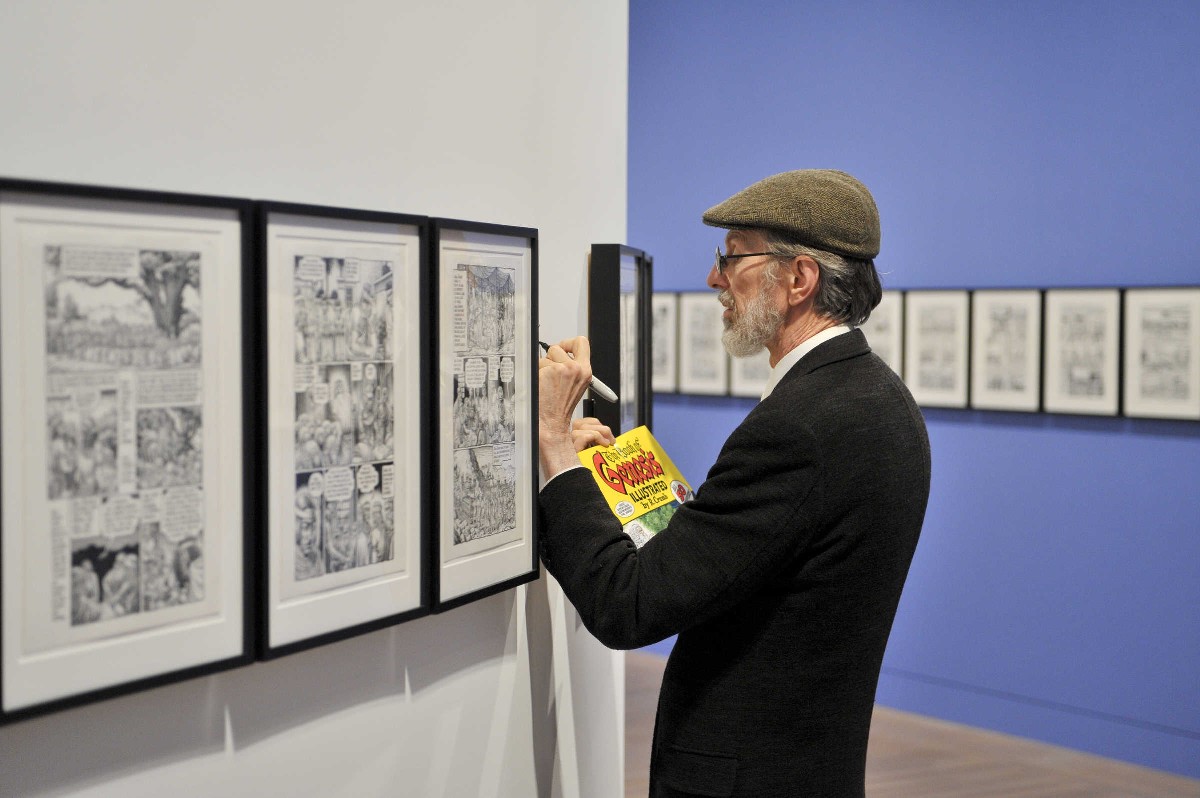
RH: So why did you decide to draw the Book of Genesis?
RC: Well, I did it partly because of the money. First I was going to make a satire of Adam and Eve. Then an agent friend of mine, Denis Kitchen, said why don't you do all of Genesis? And I said, that's alot of work. And he said, what if I find a publisher that's willing to pay you a big advance? So I said, OK, shop it around see what you can get. So he got W. W. Norton to pay a 250,000 dollar advance and I said OK, I'll do it. And I decided not to satirize it. I did it as a straight illustration job, because when I started reading Genesis I found it so strange in and of itself, so old and so interesting. It's so ancient that it's way outside any of our modern considerations of values. So I decided to expose it for what it is, for better or for worse. Every word from Genesis is in there, and I got almost no flack about it.
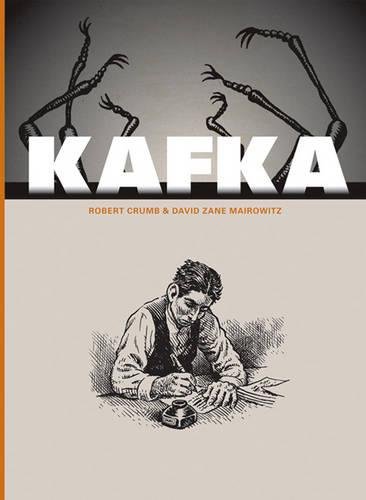
RH: The few reviews that I saw were very positive.
RC: It got alot of positive reviews. The main people who were disappointed were the German Crumb fans. They wanted me to ridicule it and were disappointed that I didn't. From religious people, nothing. It's also - I gotta tell ya - far and away the best selling thing I ever did, way beyond any of the other comics.
RH: So are you working on Exodus now?
RC: No, I'm finished with the Bible. I got so fed up with it by the time I was done. I was so glad when I got to the last panel. It ended up being quite gruelling.
RH: It's huge! You said in one of the Comics Journal interviews that you prefer short formats - 4 pages, 10 pages. You said when you start inking you want to know it won't take forever.
RC: Yeah. It's by far the longest thing I ever did. It took 4 years.
RH: Are you happy with it?
RC: It's OK. Looking at it critically now, there's lots of things I could have done differently, but it's all right.
RH: Do you have any other big projects underway now?
RC: No, I don't.
RH: You mention in the Comics Journal interviews that it's gotten harder to find time to do big projects because you have so many distractions and obligations now, interview demands...
RC: Yeah, stuff like this! All the time. Constantly.
RH: I have a quote from one of your earlier interviews: "One of my main reasons to go on living is I still think I haven't done my best work." Do you still feel that way - that you haven't done your best work yet?
RC: I probably could always do better, but I'm not sure I have it in me to do better anymore. I don't know. That's probably a very old quote.
RH: From the 1980s.
RC: I have no way of knowing if I've already done my best work. Sometimes I look at that Kafka book that I did? Sometimes I think that's my best work.
